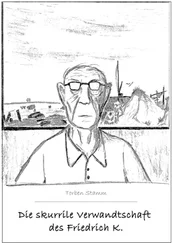Heidi gathered up her papers, returned them carefully to the folder, and put the folder next to the small backpack with her things. Then she lay down, without undressing. She still felt ashamed. At the time she had done the sketches, she had done them somehow automatically, not even thinking about what she was doing. For the first time, she had had the sense that she wasn’t just copying something, imitating, but making something original. It had been effortless, a wonderful feeling, one line after the next, as if the drawings were simply growing. Organic shapes, was the most she had thought, the organs of some creature or other. Even now she couldn’t see what everybody else seemed to see. Maybe she was just naive. She pictured herself standing in front of the selection committee, the experts looking on, and what they would make of it. She pictured herself standing naked in front of a group of old men, and one of them pointing at her pudenda, and saying that looks like a cunt, and the others cackling.
The train slowed down, and then picked up speed. It was warm in the compartment. Heidi got a water bottle out of her backpack and took a small swallow. She thought about Renate and the life she was leading. An art teacher in a small town, painting in her free time, and every couple of years or so getting a show of her work put on in some cafe room, or the staircase in an office building. Heidi had attended one of the openings, and even she had seen the full absurdity of the event. A local newspaperman had said a few garbled words about Renate’s art, and a flushed-looking Renate had gone around pulling corks and filling glasses for the few people present, all of them outsiders like herself, and listened to them say how great they thought the pictures were. It was strange that Heidi had never had any doubts about Renate before, that she had never stopped to think whether her teacher’s pictures were any good or not. Nor had she questioned Renate’s judgment either. She thought about the works of the great masters she had looked at in the library. What, compared to them, were her pencil drawings, her childish sketches?
The train had entered a station, and a cold neon light came in through the cracks in the blinds of the compartment window. Heidi looked at her watch, it was twenty past two. Without stopping to think, she jumped up, grabbed her backpack and folder, and ran down the corridor. The sleeping car attendant was standing in the open doorway, talking to a railwayman. I want to get off, said Heidi. We’re only in Innsbruck, said the conductor. I want to get off, Heidi repeated. The conductor muttered something that didn’t sound pleased, and strolled back to his compartment. He seemed to be doing everything deliberately slowly, thumbing through the envelopes that contained the passports of the travelers. At last he produced Heidi’s passport and ticket, and handed them to her. Outside, the whistle blew. Heidi jumped out of the car and the train pulled away. The railway employee was gone, there was no one in sight.
Heidi stood on the empty platform for ages. She was tired and confused and didn’t know where to go. On the schedule she saw that a train back to Switzerland was due any minute, but she couldn’t go home just yet. She picked up her things and left the station. She walked through the almost deserted city, which seemed very dark to her and rather frightening, with massive buildings and narrow lanes. There was the occasional light still on in a bar, and voices and laughter were audible, and sometimes music. But Heidi didn’t feel like being with people, she couldn’t have handled the nosy looks, the noise, and the drunken cheer of the night owls. On the banks of the Inn she sat down on a bench. She was cold, and put on her sweater.
That was the night that Heidi met Rainer. He was just going home with a few friends when he saw her sitting down by the river. He was worried she might do something silly, he said later, when she asked him why he had approached her. A woman by the river in the middle of the night, of course you thought of things like that. No, Heidi said, nothing like that had ever crossed her mind. Rainer’s friends stayed behind, shouted to him a couple of times, and then went off without him.
Rainer had sat down on the bench next to Heidi, and she told him her story, but not what Susa and Renate had said about her sketches. He didn’t seem at all interested in pictures. He took her home with him; after all, they couldn’t sit out on the bench all night. He was very sweet, and then suddenly he put his arms around her and started touching her. She didn’t fight him off for long, she had no strength and was tired and empty. Perhaps she even wanted it, the pain and the humiliation were apt punishment for her cowardice, they set the seal on her defeat. Heidi had to think about Renate, how different she was, more confident but still cautious and sensitive.
Rainer stood by the window, and Heidi stared at his hairy back and felt disgusted by him and by what he’d done with her. He turned to her and asked how old she was, and when she replied, Nineteen, he said, You’re not shitting me, are you? He was ten years older.
Heidi stayed at Rainer’s for three days. He worked in a sportswear shop, and left home every morning before nine o’clock, and only returned after business hours. Most of the time she spent in the flat, incapable of formulating a clear thought. Once, she pulled out her drawing things, and she sat for an hour in front of the empty sheet of paper without sketching a line. She sat in the dusk, waiting for Rainer, dreading him but unable to leave. She felt like a prisoner, even though he’d given her a key to the apartment. Sometimes she stood behind the front door without managing to open it. Once Rainer was back, he didn’t feel like going out. He had done the shopping, had bought bread and cheese and ham and wine, and they ate and drank, and then Rainer stripped her naked, and she let him. He was fit and strong and about a head taller than her, and he turned and twisted her and put her in positions that he liked, and demanded that she do things that were difficult for her and shaming, but still she never had the feeling that it was personal, and that he was thinking of her. He seemed very detached and entirely wrapped up in himself and his pleasure, and that was some consolation to her. He used her, but perhaps she used him even more, because she felt nothing, not even pleasure. She viewed herself as from a distance, and was surprised at herself.
HEIDI HAD NO CLEAR RECOLLECTION of time after her return home. She withdrew to her room and didn’t speak to anyone. She heard her father standing at the foot of her bed, and announcing in a loud voice, You can go back to the office now. He went away, he came back, stood there in silence and looked down at her. Her mother brought her meals, sat down on the side of the bed, talked to her or stroked her hair. Sometimes she cried. You can’t lie here always, she said, you have to eat something, say something. At night Heidi stood in front of the window for hours, gazing out at the moonlit mountains, the stony sisters, that simultaneously drew her and frightened her. She got sick. The doctor was clueless, he performed all sorts of tests on her, and Heidi let it happen. She sat on the treatment table in her underwear. The doctor wrote something in her file, and then swiveled around on his much too low chair. Everything’s fine, he said, making a face as though nothing was, except you’re pregnant.
She asked him not to tell her parents, but after a while it was impossible to conceal the fact. Her mother was first to notice, and told her father. Her parents reacted with astonishing calm. They asked Heidi who the father was, and whether he knew. Oddly, it had never occurred to Heidi to let Rainer know. What did the child have to do with him? But on her parents’ insistence, she called him. He came that weekend, and Heidi met him at the station. He was wearing good clothes, and she sensed that he had thought about everything and had a plan. They drank coffee in a place near the station, and Rainer cautiously tried to establish Heidi’s view of everything, and whether she could imagine a life with him. By the time they moved on, to lunch at home with her parents, everything was decided.
Читать дальше







![Brian Jacques - [Flying Dutchman 01] - Castaways of the Flying Dutchman](/books/128851/brian-jacques-flying-dutchman-01-thumb.webp)




